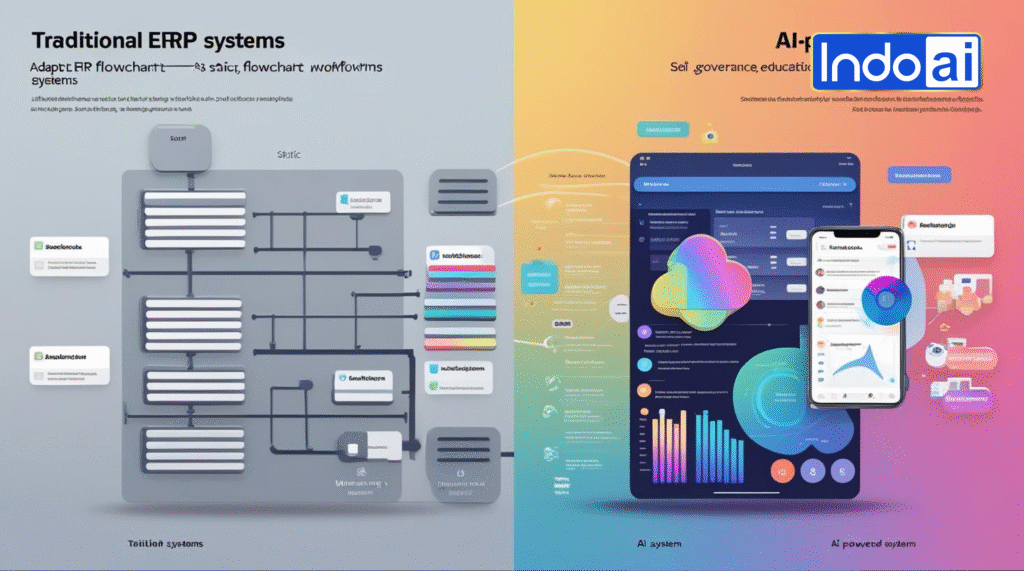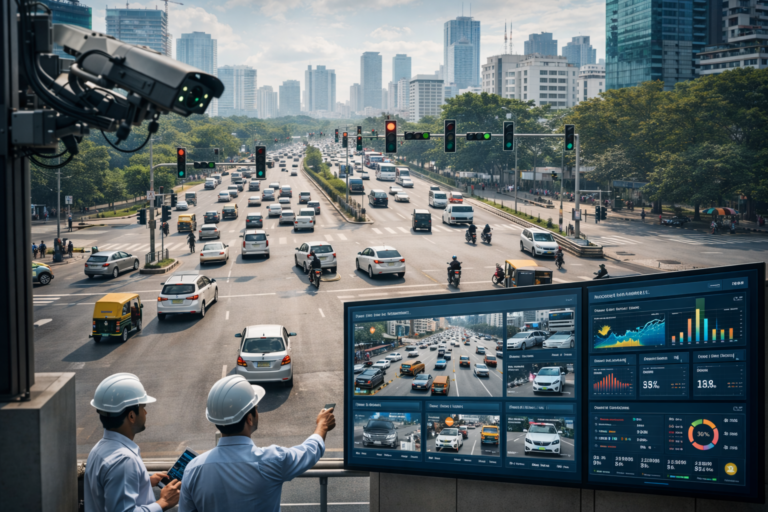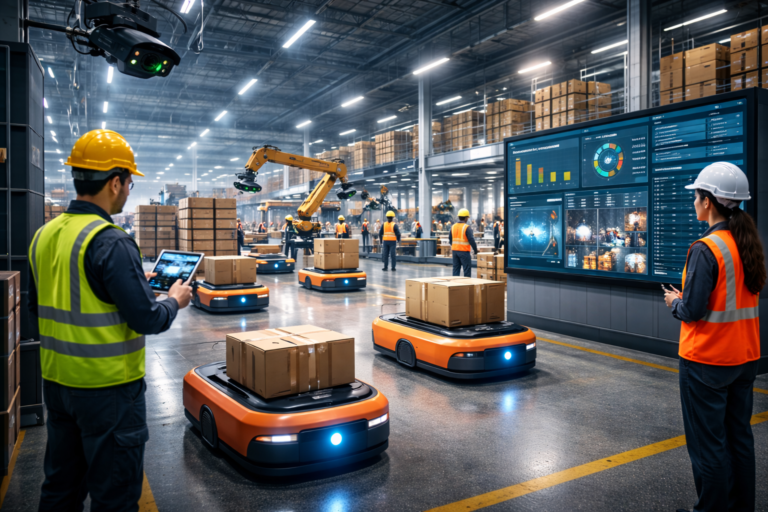From ERP Systems to AI Agents: Redefining the Landscape of Technology
The rapid pace of technological evolution has become increasingly evident with the rise of artificial intelligence (AI) agents. These dynamic, domain-specific systems are poised to revolutionize industries by replacing the rigid, linear structures of traditional Enterprise Resource Planning (ERP) systems with adaptive, real-time workflows. As the cornerstone of business operations, ERP systems once epitomized structured efficiency. However, AI agents are now emerging as their dynamic successors, promising interconnected, intelligent services that transform organizational paradigms.

From ERP to AI Agents: A Natural Evolution
ERP systems have long been the backbone of organizational efficiency, providing structured frameworks for critical operations such as finance, supply chain management, and human resources. Yet, their reliability is inherently tied to their rigidity. ERP systems operate on predefined workflows and static datasets, making them less adaptable to the fast-evolving demands of modern industries.
AI agents represent the next evolutionary step. These systems transcend the limitations of linear workflows by learning, adapting, and responding in real time. Trained in specific domains, AI agents integrate seamlessly across various organizational processes, breaking down operational silos and fostering cross-functional collaboration.
Example: AI Agents in Supply Chain Management
Consider an AI agent trained in supply chain management. Unlike ERP systems, it doesn’t merely track inventory or process shipments. This agent can:
- Interact with customer service systems to predict delivery times and improve customer satisfaction.
- Adjust inventory levels dynamically based on real-time data, such as sudden changes in demand or supply disruptions.
- Collaborate with financial systems to optimize budgeting and reduce costs.
This cross-domain functionality positions AI agents as natural successors to ERP systems, introducing unparalleled agility and intelligence into organizational operations.
AI Agents: Dynamic, Domain-Specific, and Real-Time
AI agents are not mere tools; they act as dynamic collaborators that drive operational excellence. Key attributes include:
- Adaptation to Real-Time Inputs Unlike ERP systems that rely on periodic updates, AI agents continuously analyze real-time data, enabling them to adjust operations dynamically.
- Cross-Domain Interactivity AI agents can interact across functions. For example, an education-specific AI agent can simultaneously manage administrative tasks, student services, and learning management systems, delivering holistic solutions.
- Continuous Learning and Improvement By leveraging feedback and interactions, AI agents refine their decision-making and predictive capabilities over time, ensuring sustained efficiency and accuracy.
Case Study: AI Agents in U.S. Education
In the U.S. education sector, AI agents are revolutionizing service delivery. For example, Request for Proposals (RFPs) now emphasize:
- Personalized Learning: AI agents tailor educational experiences to individual learning styles and progress.
- Administrative Automation: Tasks like scheduling, grading, and reporting are automated, freeing educators to focus on teaching.
- Real-Time Analytics: Educators receive actionable insights, enabling data-driven decisions to improve learning outcomes.
These advancements demonstrate the transformative potential of AI agents, reshaping education to become more efficient, equitable, and impactful.
AI Services: Transforming Indian Governance
India’s digital transformation journey—from Aadhaar to UPI—has laid the groundwork for AI-driven governance. “Smart Services,” powered by AI agents, are poised to redefine citizen engagement. These services extend beyond static digital portals, offering dynamic, real-time solutions tailored to individual needs.
Examples of AI Services in Governance
- Agriculture: AI agents analyze farmers’ eligibility for subsidies, provide real-time updates on policies, and recommend best practices based on weather and market trends.
- Civil Services: For tasks such as obtaining a birth certificate or filing civic complaints, AI agents streamline requests, verify documents, and provide status updates without human intervention.
- Disaster Management: During emergencies, AI agents coordinate resources, relay real-time updates, and assist in decision-making to mitigate impact efficiently.
This AI-driven governance model ensures inclusivity by making services accessible to citizens regardless of technical proficiency, while simultaneously improving operational efficiency.
The Unique Advantages of AI Agents
The widespread adoption of AI agents is driven by their distinct advantages:
- Scalability: AI agents can handle millions of interactions concurrently, making them ideal for large-scale applications.
- Cost-Effectiveness: Automating repetitive tasks reduces operational costs significantly.
- Personalization: Tailored experiences for users, whether customers, students, or citizens, enhance satisfaction.
- Real-Time Adaptation: Continuous evolution enables AI agents to respond effectively to changing needs.
- Enhanced Collaboration: Multi-agent systems collaborate dynamically, unlocking new levels of machine intelligence.
- Transparency: Agents’ interactions and decision-making processes enhance the explainability of AI outcomes.
Technical Architecture of AI Agents
The architecture of AI agents comprises:
- Data Ingestion Layer: Captures and processes real-time data from diverse sources.
- AI Core: Includes machine learning models trained for specific domains, enabling decision-making and predictive analytics.
- Interaction Engine: Facilitates seamless integration with existing systems and user interfaces.
- Feedback Loop: Continuously refines the agent’s capabilities based on interactions and outcomes.
Illustrative Example: Emergency Response System
- Real-Time Data Capture: Sensors and citizen reports feed data to the AI agent.
- Decision-Making: The AI agent analyzes the situation and recommends optimal resource allocation.
- Coordination: Integrates with emergency services to dispatch resources and provide updates.
Conclusion: A Paradigm Shift
AI agents mark a significant departure from the linear, rigid workflows of ERP systems, offering dynamic, real-time solutions tailored to evolving needs. Their potential to revolutionize industries—from education to governance—is already evident. With their adaptability, continuous learning, and cross-domain capabilities, AI agents are not just the future of technology; they are the catalysts of innovation and efficiency in the digital age.
As organizations and governments worldwide embrace AI agents, the promise of interconnected, intelligent systems is becoming a reality. For India and the global community, this shift signifies more than technological advancement; it heralds the dawn of a smarter, more efficient tomorrow.





